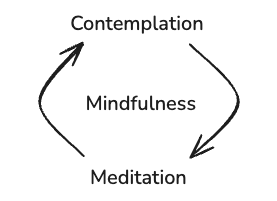Defining contemplation, mindfulness, and meditation can be difficult because these terms are often interrelated. For our purposes, I’d like to clarify how I’ll be using these terms and how they fit into the laboratory metaphor we used earlier, as well as some pitfalls I hope to avoid by using these terms as I do.
Pitfalls
As we’ll discuss in developing a working definition of mindfulness, many modern approaches to mindfulness rob the practice of its context, especially its ethical/moral context. Mindfulness is often appropriated with a goal-oriented mindset (the goal is to get calmer, happier, more productive, etc.). As the body of research on mindfulness grows, so too do the list of benefits. So, there’s a lot on offer in the vein of wellbeing, but, when we make mindfulness about attaining certain goals, we reduce it to another life hack.
As with the Socratic project, mindfulness is more a practice of unlearning than of learning or leveling up. It’s an innate capacity we all have to look at our experience - good and bad - with openness and curiosity. Such a capacity can’t be limited to any particular goal.
I feel similarly about research on the benefits of music lessons or simply playing for children. Yes, studying a musical instrument can improve math scores, and freely playing with one’s friends can improve social-emotional learning. But, the moment we start doing those things for the express purpose of attaining those outcomes, we rob the activities of their worth. Let kids play to play. Play guitar because it’s enjoyable and fulfilling. If it happens to lead to other benefits, terrific.
The same goes for mindfulness. Yes, the benefits are myriad. But, paradoxically, if we’re after the benefits, we’re less likely to get them. So, the kinds of bespoke practices we see in many modern mindfulness trainings, practices aimed at specific outcomes, are incomplete.
Our Approach
Rather that designing mindfulness practices and meditations for specific aims, I prefer to think about a dialectic between practice and integration. This is an idea that came to me after talking to a psychologist friend who does psychedelic assisted therapy. When a patient is on their “trip,” the therapist is there to provide some guardrails but not to lead them in any particular direction or towards any particular realization. After the trip, the patient has a number of integration sessions during which they integrate their experience back into their everyday life.
Most meditation experiences are nothing like a psychedelic trip in intensity, but there are some similarities. Psychedelics turn off many of the filters our brains put in place to create a coherent picture of the world. Most of these filters are learned over time. For an infant, their experience of the world is completely unmediated by language or concepts. They don’t see a car, they see an interplay of colors, light, and shadow.
If we take meditation to be simple, bare awareness of the present moment without any intentions or conceptual interpretations, then we’re trying to recover that childlike (beginner’s mind), to see into our habituated ways of thinking, reacting, and behaving. When we meditate, we go on a little excursion, looking into the mind’s operations. Then, we use contemplation practices to integrate those learnings and experiences into our lives. Mindfulness is like the engine that keeps this reciprocal process running.
Think of it like this. If you don’t already, imagine you need glasses to see clearly. Sometimes, you take your glasses off and look at the lenses to see if they’re dirty. You then clean off the dirt and put them back on, and things look clearer. Meditation is like the act of taking off your glasses, looking at the lenses, and cleaning them off1. Contemplation is like the act of putting your glasses back on and seeing how the world looks different.

Footnotes
-
Really, the “cleaning off” happens on its own. Like a snow globe that’s been shaken up, you just have to set it down to let the fake snow settle. So it is with the mind. We just have to sit in stillness for a while to let the mind settle. ↩